If you’ve ever wondered what is halal or what does halal mean, you’ve come to the right place. The halal concept is fundamental for millions of Muslims worldwide, but it’s also gaining interest among people who value quality, hygiene, and transparency in food. In this comprehensive article, we’ll explore the halal meaning, halal food, halal products, and everything related to halal certification.
Whether you’re seeking to better understand your religious practices as a Muslim, or simply want to know more about halal food and halal meat, you’ll find clear answers to all your questions here. From the most basic halal definition to the most complex aspects of certification, we’ll explain everything in an accessible and practical way for your daily life.
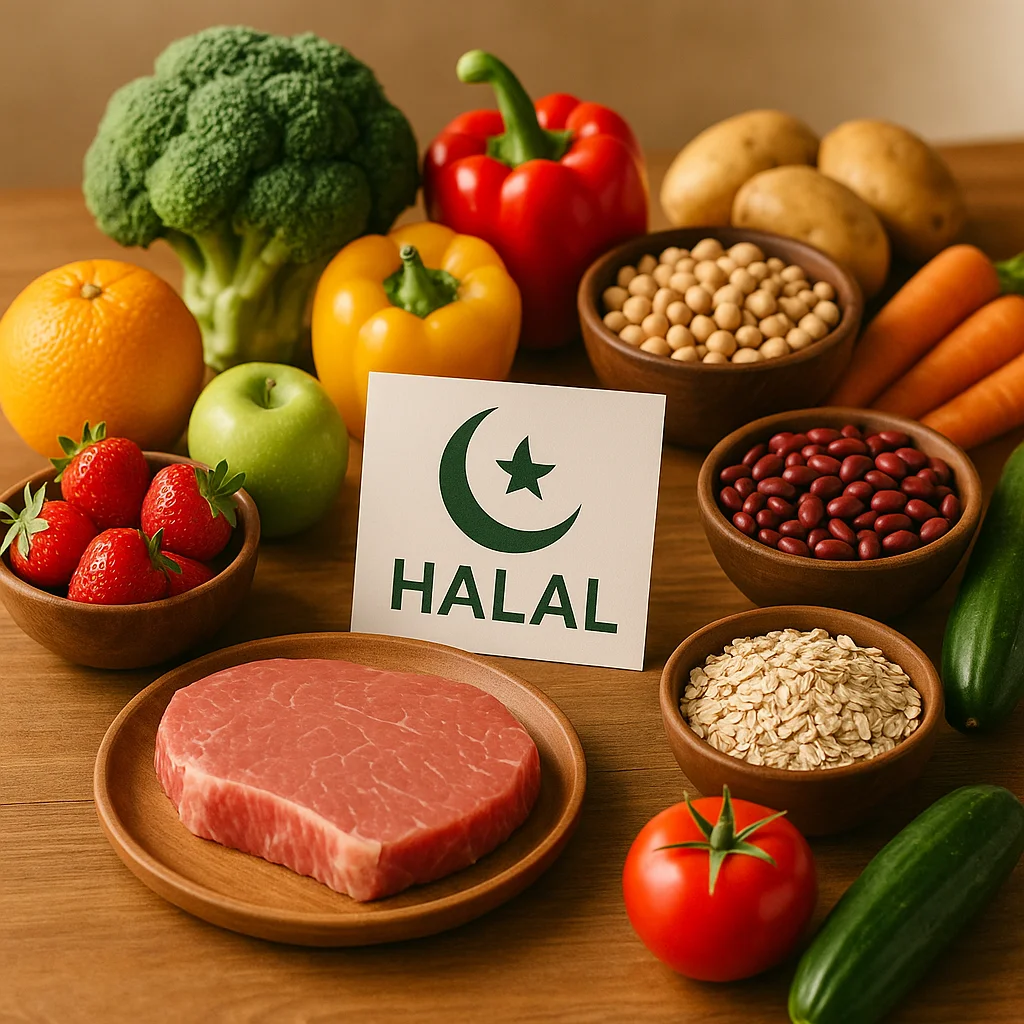
What Does Halal Mean: Definition and Origin
To truly understand what is halal, we must first know its deep meaning and its roots in Islamic tradition. This term goes far beyond a simple label on foods; it represents a complete lifestyle guided by the teachings of Islam.
Halal Meaning in Arabic
The word halal (حلال) is an Arabic term that literally means “permitted,” “lawful,” or “legal.” When we talk about halal meaning, we refer to everything that is authorized according to Islamic law, known as Sharia. This law comes from the Quran (the word of Allah) and the Sunnah (the teachings of Prophet Muhammad, peace be upon him).
The halal meaning goes far beyond food. It encompasses all aspects of a Muslim’s life: how they behave, how they speak, how they dress, how they earn their money, and of course, what they eat and drink. However, when most people ask what does halal mean, they generally refer specifically to Islamic dietary practices, which are the most visible in everyday life.
The halal definition is clearly established in the Quran. In Surah Al-Baqarah, verse 168, Allah says: “O humanity! Eat from what is lawful and good on the earth and do not follow Satan’s footsteps.” This verse establishes a fundamental principle: everything that Allah has created is halal for our use, except that which He has specifically prohibited. We don’t live in a world of restrictions, but of abundance with wise limits.
The basic principle is revolutionarily simple: everything is halal unless the Quran or Sunnah explicitly prohibit it. This means that most of creation is at our disposal to enjoy, with only a few specific exceptions established by Allah for our own good. The Quran reinforces this by saying:
هُوَ ٱلَّذِى خَلَقَ لَكُم مَّا فِى ٱلْأَرْضِ جَمِيعًۭا ثُمَّ ٱسْتَوَىٰٓ إِلَى ٱلسَّمَآءِ فَسَوَّىٰهُنَّ سَبْعَ سَمَـٰوَٰتٍۢ ۚ وَهُوَ بِكُلِّ شَىْءٍ عَلِيمٌۭ ٢٩
“It is He who created for you all of that which is on the earth. Then He directed Himself to the heaven, [His being above all creation], and made them seven heavens, and He is Knowing of all things.”
📜 (Quran 2:29).
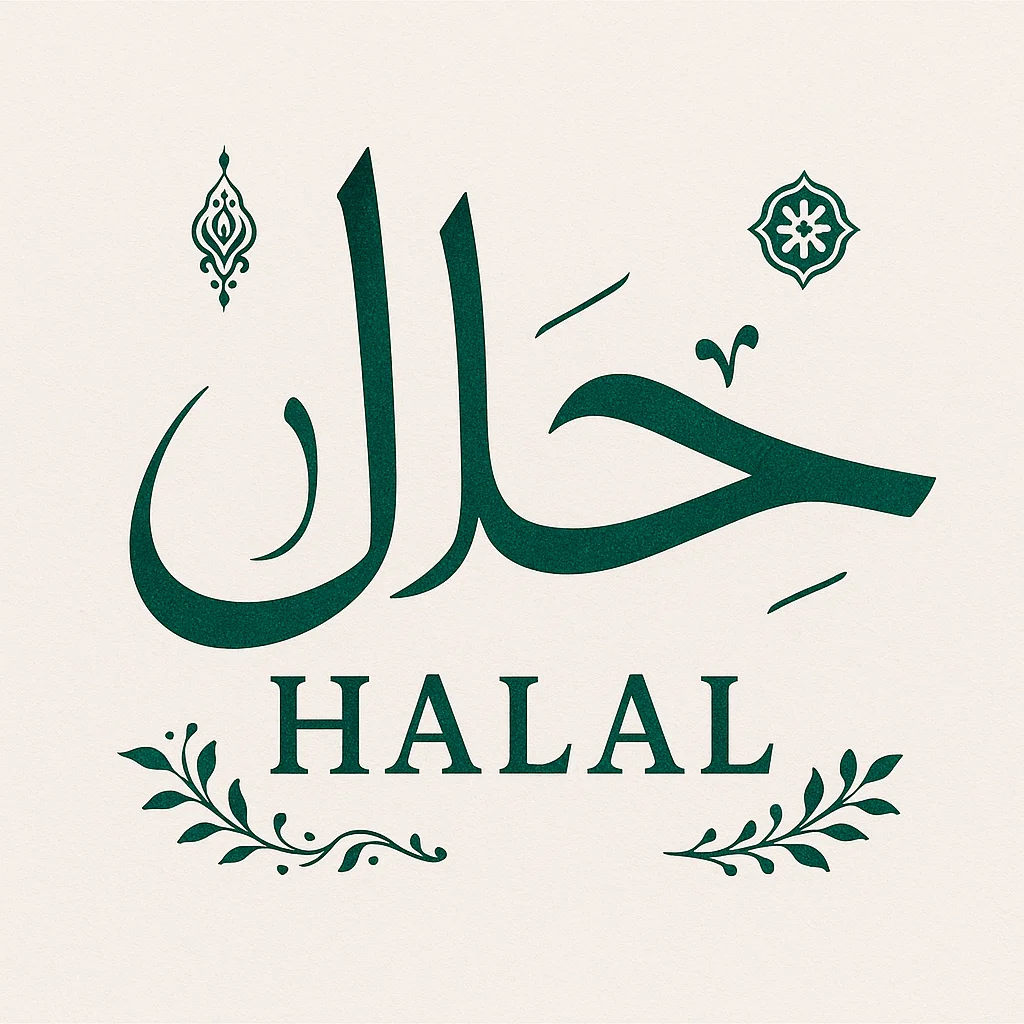
Difference Between Halal and Haram
To fully understand what is halal, it’s essential to know its opposite: haram (حرام), which means “forbidden” or “unlawful.” These two concepts clearly define the boundaries of what a Muslim can and cannot do, and they are not arbitrary but established by Allah for our well-being.
When we speak of halal, we refer to everything that contributes to our integral well-being: foods that nourish our body in a healthy way, practices that elevate our spirit, honest means of earning a living, and relationships based on justice. On the other hand, haram refers to what Allah has forbidden because it can cause us physical, mental, or spiritual harm. Forbidden foods like pork and alcohol are not capriciously prohibited; these substances can harm our body and mind in various ways.
Between halal and haram exists an intermediate category called mashbooh (doubtful), which refers to things about which there is no absolute certainty. Prophet Muhammad (peace be upon him) taught:
“The halal is clear and the haram is clear; between these two are doubtful matters. Whoever avoids doubtful things will have protected his religion and his honor.”
Practicing Muslims prefer to avoid what is mashbooh to stay completely on the safe side.
The fundamental principle governing this distinction is clear: everything is halal unless explicitly prohibited. The Quran says:
وَمَا لَكُمْ أَلَّا تَأْكُلُوا۟ مِمَّا ذُكِرَ ٱسْمُ ٱللَّهِ عَلَيْهِ وَقَدْ فَصَّلَ لَكُم مَّا حَرَّمَ عَلَيْكُمْ إِلَّا مَا ٱضْطُرِرْتُمْ إِلَيْهِ ۗ وَإِنَّ كَثِيرًۭا لَّيُضِلُّونَ بِأَهْوَآئِهِم بِغَيْرِ عِلْمٍ ۗ إِنَّ رَبَّكَ هُوَ أَعْلَمُ بِٱلْمُعْتَدِينَ ١١٩
“And why should you not eat of that upon which the name of Allah has been mentioned while He has explained in detail to you what He has forbidden you, excepting that to which you are compelled. And indeed do many lead [others] astray through their [own] inclinations without knowledge. Indeed, your Lord – He is most knowing of the transgressors.”
📜 (Quran 6:119).
This gives us tremendous freedom to enjoy the vast majority of creation, avoiding only those few things that Allah has specifically forbidden for our good. This is Allah’s mercy manifesting in His laws.
What is Halal Food?
When we talk about halal food or halal food, we refer to a complete food system that goes far beyond simply avoiding certain foods. We’re talking about all foods and beverages that meet the requirements established by Islamic law to be considered suitable, pure, and beneficial for Muslim consumption.
Basic Principles of Halal Food
Halal food is based on clear principles that guarantee that halal foods are not only religiously permissible, but also pure, healthy, and ethically obtained. The first and most fundamental is the concept of tayyib (purity and cleanliness). The Quran not only commands eating halal, but also tayyib, which means “good, clean, and healthy.” A food may be technically halal, but if it’s not tayyib (contaminated, spoiled, or of low quality), it shouldn’t be consumed.
The second principle is the origin of the food. For a food to be halal, it must come from permitted sources. Land animals must be herbivores specifically authorized in Islam. Carnivorous animals and birds of prey are forbidden. Sea animals are generally halal without special restrictions, which makes fish a convenient and safe option.
The third fundamental principle is the method of obtaining, particularly critical for meat. Halal meat is not simply beef or chicken; it must come from animals slaughtered according to the specific Islamic ritual called dhabiha or zabihah. This ritual, which we’ll see later, ensures that the animal suffers as little as possible and that the meat is as pure and hygienic as possible.
The fourth principle is the absence of cross-contamination. Halal foods must be kept completely separate from haram substances during all processing, storage, and preparation. Equipment and surfaces used must not have been in contact with haram products, or if they have been, they must be thoroughly cleaned according to Islamic protocols. Finally, throughout the production process, halal products must be processed according to Sharia, without adding haram ingredients and maintaining rigorous hygiene standards.
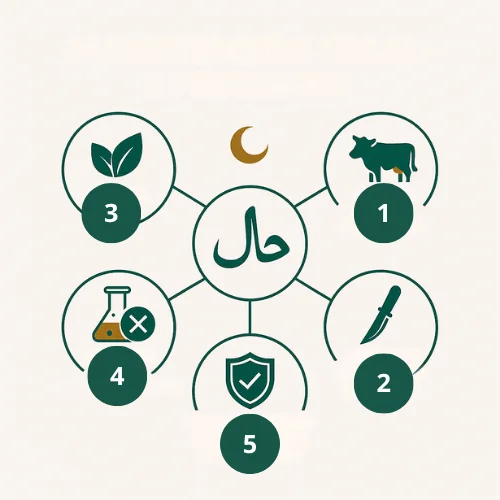
Permitted Halal Foods
The list of halal foods is extraordinarily extensive and encompasses the vast majority of what we find in nature. This surprises many people who think Muslims have a very restricted diet, when the reality is exactly the opposite.
Regarding permitted meats, Muslims can consume beef, cow, ox, lamb, sheep, goat, camel, chicken, turkey, duck, quail, rabbit, venison, and deer. It’s absolutely critical to understand that all these meats are only halal if the animal has been slaughtered according to the Islamic method of dhabiha. If you buy chicken meat in a conventional supermarket without halal certification, that meat is not halal, even though chicken is a permitted animal.
Seafood products are much simpler. All types of fish with scales are completely halal according to all schools of thought: salmon, tuna, hake, cod, sardines, and hundreds of other species. Fish doesn’t require special ritual slaughter, which means you can buy it at any regular fish market. Shellfish (shrimp, lobsters, octopus, squid) have divided opinions: some schools permit them all, while the Hanafi school is more restrictive. When in doubt, fish with scales is always safe.
Dairy products are halal: milk, yogurt, butter, and cheeses (as long as the rennet is vegetable or from animals slaughtered in a halal manner). All grains, cereals, and legumes are halal: rice, wheat, lentils, chickpeas, beans. All fruits and vegetables are naturally halal. Nuts, seeds, vegetable oils, eggs from permitted birds, honey (specifically mentioned in the Quran as beneficial), and natural sweeteners like sugar and dates are also halal. This abundance demonstrates Allah’s generosity.
Forbidden Foods (Haram)
To fully understand halal food, we must know what foods are haram. The list of forbidden foods is specific and limited, demonstrating that Islam doesn’t seek to restrict unjustifiably but to protect us from what is genuinely harmful.
The best-known and absolute prohibition is pork meat and all its derivatives. This includes fresh meat, ham, bacon, sausages, lard, pork gelatin, and any product containing pork-derived ingredients. The Quran is explicit: “Forbidden to you are: dead meat, blood, the flesh of swine…” (Quran 5:3). Even products with minimal traces of pork are haram.
Alcohol and all intoxicating substances are completely forbidden. All alcoholic beverages are prohibited: wine, beer, liquor, whisky. This prohibition extends to foods cooked with alcohol and extracts containing alcohol as a solvent (like many vanilla extracts). The Quran says: “Intoxicants, gambling… are abominations and works of Satan. Avoid them” (Quran 5:90). Alcohol intoxicates, clouds judgment, causes addiction and health problems.
The blood of any animal is forbidden, which is why the halal method includes complete drainage of blood. Carnivorous animals and birds of prey are forbidden: animals with fangs that hunt (lions, tigers, wolves, dogs), birds of prey with talons (eagles, hawks, vultures). Specific animals like domestic donkeys, mules, frogs, snakes, scorpions, mice, and other pests are also haram.
Meat from animals not correctly slaughtered is haram, even if the animal is of a permitted species. If a cow wasn’t slaughtered according to dhabiha, its meat is haram. This includes animals that died naturally (carrion), sacrificed without mentioning Allah’s name, or sacrificed causing unnecessary suffering. This is why meat in conventional supermarkets without halal certification is generally not halal.
In the modern world, many hidden ingredients are haram. Gelatin (almost always from pork in Western products), emulsifiers like E471 and E472 (may be from animal fats), colorant E120 or carmine (from insects), enzymes in cheeses (may be from pork), glycerin (may be animal), and numerous other additives require verification. This is why halal certification is essential: without it, it’s extremely difficult to know if all ingredients in a processed product are truly halal.
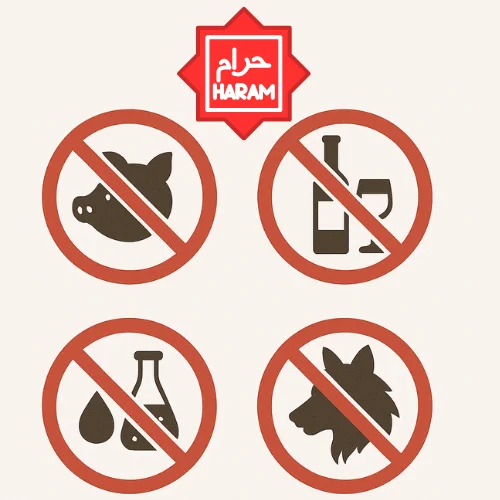
What is Halal Meat and How is it Obtained?
Halal meat is probably the best-known aspect of halal food, but it goes far beyond simply selecting the correct type of animal. The halal meat meaning is deeply linked to the specific method of slaughter and the ethical treatment of the animal throughout its entire life. For Muslims, meat is not only halal by the type of animal, but mainly by how it was treated and slaughtered.
Ritual Slaughter Process (Dhabiha/Zabihah)
The halal meat meaning is inseparably linked to the Islamic ritual slaughter process known as dhabiha or zabihah. This method is not an arbitrary set of rituals, but a carefully designed process that fulfills multiple objectives: complying with Allah’s commandments, minimizing the animal’s suffering, guaranteeing maximum meat hygiene, and constantly reminding us that life is sacred.
Before slaughter, several important requirements must be met. The animal must be completely alive and healthy at the time of slaughter, must be calm and without stress, and must not see other animals being slaughtered. The knife must be extremely sharp to allow a quick and clean cut, and it shouldn’t be sharpened in the animal’s presence to avoid causing it anxiety. The animal is placed in a comfortable position, preferably on its left side, with its head oriented toward Mecca.
The crucial moment of slaughter has several specific steps. Just before the cut, the slaughterer must pronounce the sacred words: “Bismillah, Allahu Akbar” (In the name of Allah, Allah is the Greatest). This invocation is not optional; it’s absolutely mandatory for the meat to be halal. If intentionally omitted, the meat is not halal under any circumstances. This invocation acknowledges that the animal’s life is a gift from Allah and that only with His permission can we take it.
The cut must be quick, firm, and continuous, simultaneously sectioning four critical structures: the trachea, esophagus, the two carotid arteries, and the two jugular veins. It’s crucial that the spinal cord remains intact; the animal must not be completely decapitated during the initial cut. After the cut, the animal must be suspended to allow blood to drain completely from the body. Cutting the main arteries immediately and completely interrupts blood flow to the brain, causing loss of consciousness within seconds. The convulsions that may be observed afterward are automatic nerve reflexes, not signs of conscious pain. This method, when executed correctly with an extremely sharp knife and by an experienced person, results in very rapid loss of consciousness and minimal suffering.
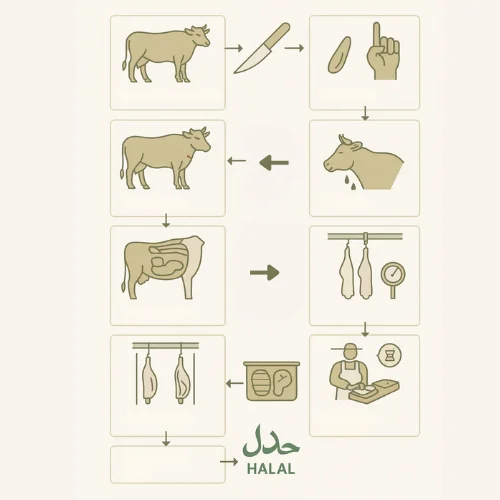
Requirements for Halal Slaughter
For meat to be truly and completely halal, the process must meet strict requirements established by Islamic law. These are not optional suggestions but absolute conditions that must be fulfilled without exception.
Requirements related to the slaughterer are fundamental. The person performing the slaughter must be Muslim, Christian, or Jewish (People of the Book), although most scholars strongly prefer them to be Muslim. They must be mentally competent and in their right mind, cannot be intoxicated or incapable of understanding what they’re doing. They must have deep knowledge of the correct dhabiha method; it’s not enough to be Muslim without knowing how to perform the slaughter appropriately. They must have the correct intention (niyyah) to perform the slaughter to produce halal meat, not for any other purpose contrary to Islam.
Animal requirements are equally important. It must be of a permitted species in Islam like bovines, ovines, caprines, poultry. There’s no way to make the meat of a forbidden animal like pork halal, no matter how it’s slaughtered. The animal must be completely alive and in good health at the time of slaughter. It cannot be seriously ill, blind in both eyes, extremely old or weak, or have serious wounds. These health requirements ensure we only consume meat from genuinely healthy animals whose meat is nutritious and safe.
Instrument and procedure requirements are also specific. The knife must be extremely sharp, made of metal, and completely free of nicks or damage. Mentioning Allah’s name (tasmiyah) is absolutely mandatory and must be pronounced just before the cut. The cut must section the trachea, esophagus, and at least three of the four main arteries. The location of the cut is important: it must be on the neck, not on another part of the body.
A much-debated question is stunning before slaughter. The traditional majority position is that the animal must be completely conscious at the time of slaughter, since it must be genuinely alive and any stunning that causes death would invalidate the slaughter. Some contemporary scholars permit reversible stunning under very specific conditions, but most halal certifiers don’t allow any stunning or only very specific and limited forms. Animal welfare requirements throughout its life are also integral: the animal must have received appropriate feeding, veterinary care when necessary, and must not have suffered mistreatment at any time.
Halal Meat Meaning and Characteristics
Now that we understand the process, we can delve deeper into the broader halal meat meaning and the characteristics that distinguish this meat from conventional meat. Halal meat represents much more than a food product; for Muslims, consuming it is an act of obedience to Allah, a way of maintaining spiritual purity, and a constant reminder of their responsibility toward God’s creation.
The physical characteristics of halal meat distinguish it specifically. The first and most significant is that it’s practically free of blood due to complete drainage. Blood is an ideal medium for bacterial growth, and its elimination contributes to cleaner and more hygienic meat. Halal meat tends to preserve better and longer because the absence of blood means less moisture contributing to decomposition. Many consumers report that halal meat has a cleaner and less “strong” taste than conventional meat, possibly due to the absence of blood that can contribute to a metallic taste.
Halal certification implies much stricter controls than those applied to conventional meat. From the animal’s birth until the meat reaches the consumer, each step is documented, audited, and verified. This means greater complete traceability: if there’s any problem, it’s much easier to trace the exact origin and take measures. Many halal certifiers are incorporating strict requirements about animal welfare throughout the animal’s life, not just at the moment of slaughter, including adequate space, natural feeding, veterinary care, and prevention of suffering.
When we compare halal meat with conventional meat, the differences are clear. The slaughter method in halal requires precise ritual cutting with invocation of Allah’s name, while conventional meat uses various methods, many with stunning. Blood drainage in halal meat is complete and exhaustive by design, while in conventional it’s variable. Halal certification requires continuous verification by Islamic organizations, while conventional only requires standard sanitary certification. Prior stunning is generally not permitted in halal, while it’s common in conventional production.
In the market, we find various types of halal meat: halal red meat (beef, lamb, goat), halal poultry (chicken being the most common, turkey, duck), processed halal meat (sausages, burgers, nuggets, always with certification), and organic halal meat that combines halal standards with organic production. It’s crucial to understand that the term “halal meat” is not simply a marketing label, but a verifiable religious and ethical guarantee that the product meets all Islamic requirements from the animal’s birth to your table. For this reason, Muslims must be extremely diligent in verifying that the meat has legitimate halal certification from a recognized organization.
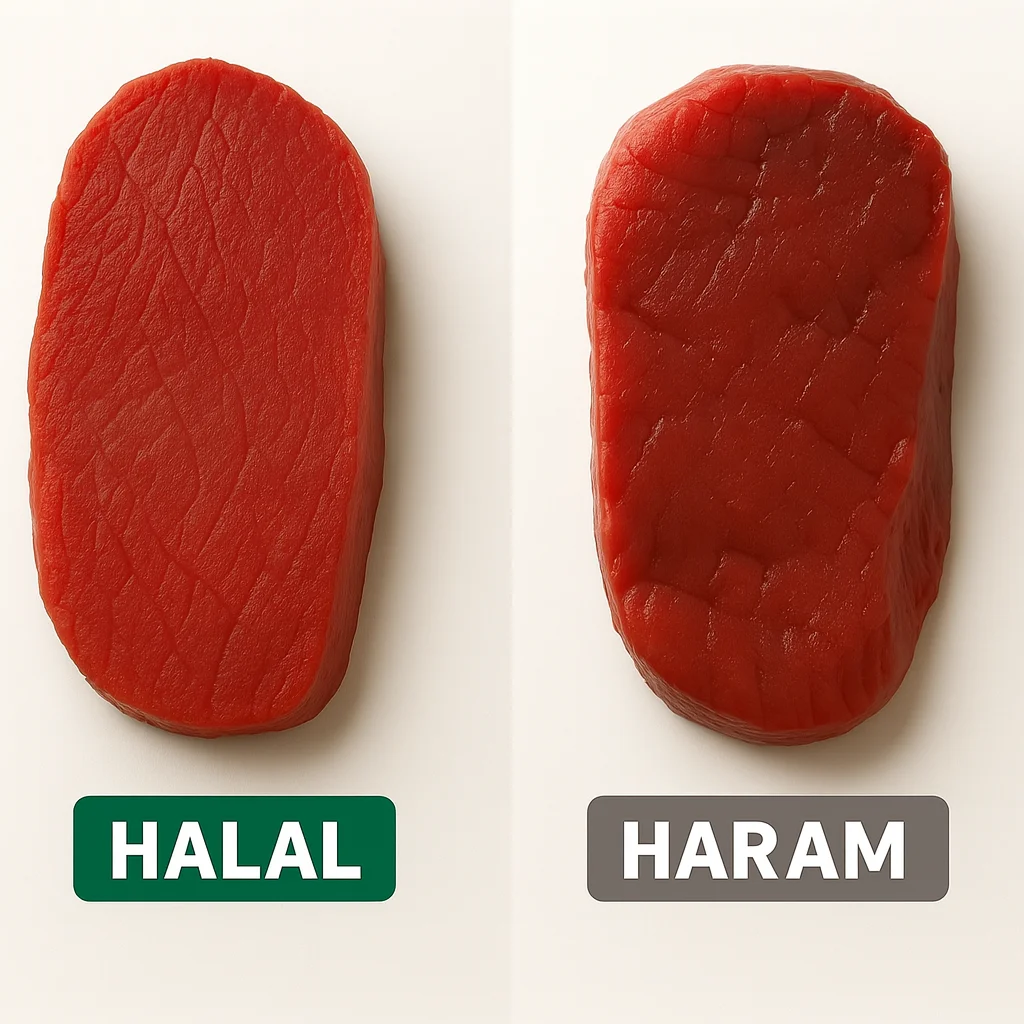
Halal Certification: What is it and How Does it Work?
In the modern world with complex global supply chains and thousands of processed ingredients, halal certification has become absolutely essential to guarantee that halal products truly meet all Islamic requirements. We can no longer simply buy meat from the trusted local Muslim butcher; we need formal verification systems.
Halal Certification Process
Halal certification is a formal procedure by which a competent authority exhaustively verifies that a product, service, or establishment complies with all requirements of Islamic law. This process is profound and continuous, examining every aspect from raw materials to the final product.
To understand why certification is so necessary today, let’s consider how the world has changed. In the past, Muslims bought in small communities where they personally knew the butcher and ingredients were simple: meat, salt, recognizable spices. Today, products contain dozens of ingredients from multiple countries, manufacturing processes are extremely complex, there’s real risk of cross-contamination when the same facilities process halal and haram products, and many ingredients have incomprehensible technical names like “mono and diglycerides of fatty acids.” Without specialized knowledge, it’s impossible to know if they’re halal.
The certification process has multiple rigorous stages. It begins with an initial application where the company presents information about its products and processes. This is followed by a preliminary evaluation where the certifying organization reviews all documentation and analyzes product formulations, identifying any potentially problematic ingredients. Then comes an exhaustive ingredient audit where the origin of absolutely every ingredient is meticulously verified, requesting halal certificates from suppliers and complete technical sheets.
The next stage is a physical inspection of the facilities where specialized auditors personally visit the production plant, examine production lines, storage areas, equipment, cleaning procedures, and evaluate staff training. The complete production process is evaluated from receipt of raw materials to the finished product. It’s verified that robust quality control and traceability systems exist. If everything complies satisfactorily, the official halal certificate is issued authorizing use of the halal seal or logo, generally valid for one or two years.
But certification doesn’t end there. There’s constant supervision with scheduled periodic audits (monthly, quarterly, or annual) and surprise inspections without prior notice to ensure standards are consistently maintained. Any change in formulations or suppliers must be reported and may require re-evaluation. The complete process from application to obtaining the certificate generally takes between one and three months, depending on the case’s complexity and the company’s preparation.
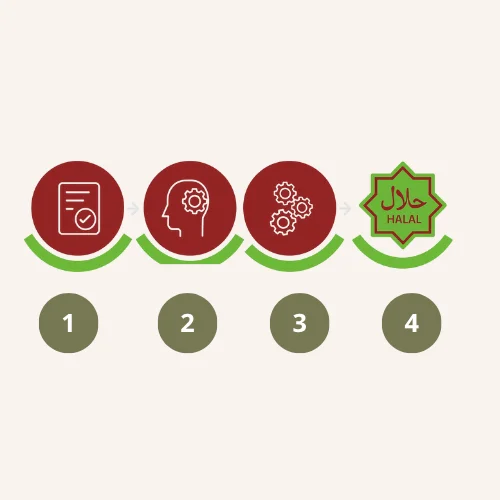
Certifying Organizations
There are numerous halal certification organizations around the world, and it’s important to know how to identify genuinely recognized and trustworthy organizations. Not all organizations are equal, and unfortunately fraud exists in this field.
A trustworthy certifying organization has distinctive clear characteristics. First, it must have legitimate religious backing: be endorsed by recognized Islamic authorities, have staff with deep knowledge of Sharia, and have qualified Islamic scholars on its council. Second, it must have demonstrable experience with years of track record in halal certification and good reputation in the Muslim community. Third, it must have international accreditations with recognition by Muslim-majority countries like Malaysia, Saudi Arabia, and United Arab Emirates, and membership in international halal standards organizations. Fourth, it must operate with transparency having clearly defined processes and published criteria. Fifth, it must maintain independence and impartiality without conflicts of interest.
Different regions of the world have particularly recognized organizations. In Spain and Europe, the Halal Institute is widely respected, working under the framework of the Islamic Junta. The Halal Monitoring Committee (HMC) in the United Kingdom is known for its particularly strict standards. In Latin America, CDIAL Halal and ChileHalal operate in several countries. In North America, IFANCA (Islamic Food and Nutrition Council of America) and ISNA (Islamic Society of North America) are large and respected organizations. In the Middle East, authorities like ESMA in Emirates and SFDA in Saudi Arabia set standards. In Asia, JAKIM from Malaysia is considered the global gold standard, and its certificates are accepted globally.
It’s important to understand that although all these organizations follow Islam’s fundamental principles, differences may exist in interpretations of specific details. For example, some may accept certain forms of reversible stunning under specific conditions, while others completely prohibit it. Some may be stricter about which specific additives they permit. These differences reflect different schools of Islamic thought (madhabs), all legitimate within Islam.
For consumers, the recommendation is to look for products certified by recognized organizations in your region and accepted by your local community. Ask at your mosque which organizations are trustworthy. Verify that the organization appears on internationally recognized certifier lists. An extremely useful tool is the Tag Halal application that allows you to scan products and verify their certification quickly and reliably.
How to Verify Halal Products
With so many products on the market and cases of fraud where products are falsely labeled as halal, it’s crucial that consumers know how to effectively verify that halal products are genuine and authentically certified.
The first and most important indicator is the presence of a halal certification seal or logo on the packaging. This seal should include several elements: the certifier organization’s logo or symbol (frequently with a crescent moon), the full name of the certifying organization, ideally a unique verifiable certificate number, and in some cases the expiration date or certification year. Recognized seals include the Crescent M, JAKIM’s logo, the Halal Institute seal, HMC’s logo, and IFANCA’s seal. Familiarizing yourself with these seals will help you quickly identify genuine products.
However, seeing a logo is not enough; you must verify that it’s authentic. The most reliable and easy method is to use mobile technology. The Tag Halal application is an invaluable tool that every conscious Muslim should have on their phone. This application allows you to scan product barcodes while you’re in the store and immediately provides information about whether the product is halal, haram, or mashbooh (doubtful). It has an extensive database that’s regularly updated, is particularly useful in conventional supermarkets, and helps you identify problematic ingredients with technical names you might not recognize.
In addition to using Tag Halal, you can verify in other ways. Many certifying organizations have websites with online databases where you can search for certified products. Some certificates include scannable QR codes that take you directly to verification on the certifier’s website. You can directly contact the certifying organization by phone or email with the certificate number to confirm authenticity.
It’s also prudent to always read the ingredient list, even if it has a halal seal. Although the seal should guarantee everything is halal, reading ingredients helps you be more informed and quickly identify if there’s something obviously problematic that could indicate a fake seal. Watch for problematic E-codes like E120 (carmine), E441 (gelatin), E471 and E472 (mono and diglycerides). Be careful with ingredients like gelatin without specified origin, unspecified enzymes, L-cysteine, and terms indicating alcohol like “vanilla extract” or “artificial flavors.”
When you’re verifying restaurants instead of packaged products, look for a physical halal certificate clearly visible in a prominent place, generally near the entrance. The certificate should be current, identify the certifying organization, and specifically name the establishment. If you don’t see a certificate, ask: Do you have current halal certification? From which organization? Are all ingredients halal? Do you use alcohol in cooking? Is there separation between halal and non-halal areas? A truly halal and honest establishment will have no problem answering these questions.
It’s crucial to have the habit of always verifying before buying or eating. Never assume something is halal based only on the type of establishment or the owner’s origin. When you have serious doubts, you can contact the manufacturer, ask an imam, seek information in the Muslim community, or apply the principle of precaution: when you have serious doubt, it’s better to avoid it. Also be alert to signs of fraud: seals that look homemade or unprofessional, products claiming to be halal without showing certification, suspiciously low prices on “halal” meat, establishments without visible certificate, or expired or blurry certificates.
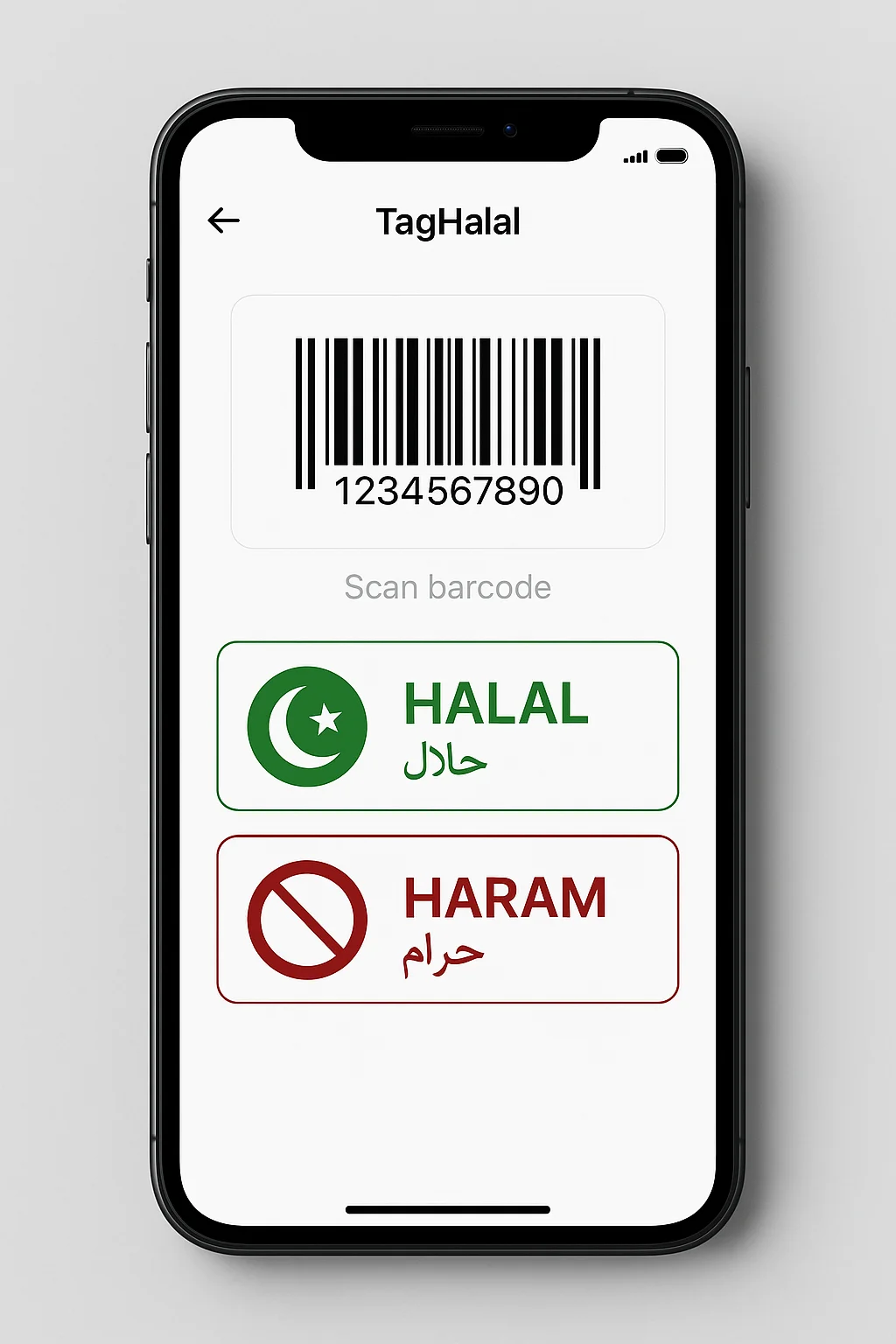
Halal Products: Beyond Meat
When we ask what is halal, many people immediately think of meat. However, the concept of halal products extends far beyond the butcher’s counter. Practically everything a Muslim consumes, uses on their body, or interacts with can and should be evaluated from the halal perspective. This includes processed foods, cosmetics, personal care products, medications, and much more.
Halal Processed Foods
Halal processed foods represent a rapidly growing sector but require special attention. Unlike simple foods like an apple or rice, processed foods contain multiple ingredients from different sources, pass through complex manufacturing processes, and frequently include additives with technical names incomprehensible to the common consumer. Bakery and confectionery products like breads, cookies, cakes, and chocolates may contain emulsifiers of animal origin, hidden lard, or problematic glycerin. Sweets like candies and gummies almost always contain gelatin that, unless it specifies it’s from fish or has halal certification, generally comes from pork.
Processed dairy products present their own challenges. Cheeses require special attention because they’re traditionally made with rennet, an enzyme from calves’ stomach that must be from halal or vegetable source. Yogurts may contain gelatin to improve texture, especially Greek-type ones. Ice cream may have emulsifiers of doubtful origin and flavorings with alcohol as a carrier. Prepared and frozen meals frequently contain broths made with pork bones, non-halal meat, or are seasoned with problematic ingredients. Asian sauces like soy sauce, oyster sauce, or teriyaki frequently contain alcohol in their fermentation.
Processed beverages, although they may seem simple, also require verification. Juices may contain colorants of animal origin like E120 (insect carmine). Energy drinks may include taurine that, although today is generally synthetic, historically was derived from ox bile. Breakfast cereals may contain glycerin in coatings or vitamins of animal origin. Granola bars frequently include glycerin, gelatin, or questionable flavorings. The safest way to identify halal processed foods is to look for clear and visible certification from a recognized organization. Even with certification, it’s good practice to read ingredient labels to familiarize yourself with what ingredients are problematic and educate your knowledge. If you have doubts about a specific ingredient, don’t hesitate to contact the manufacturer, as many companies have customer service that can answer questions about origins and ingredients.
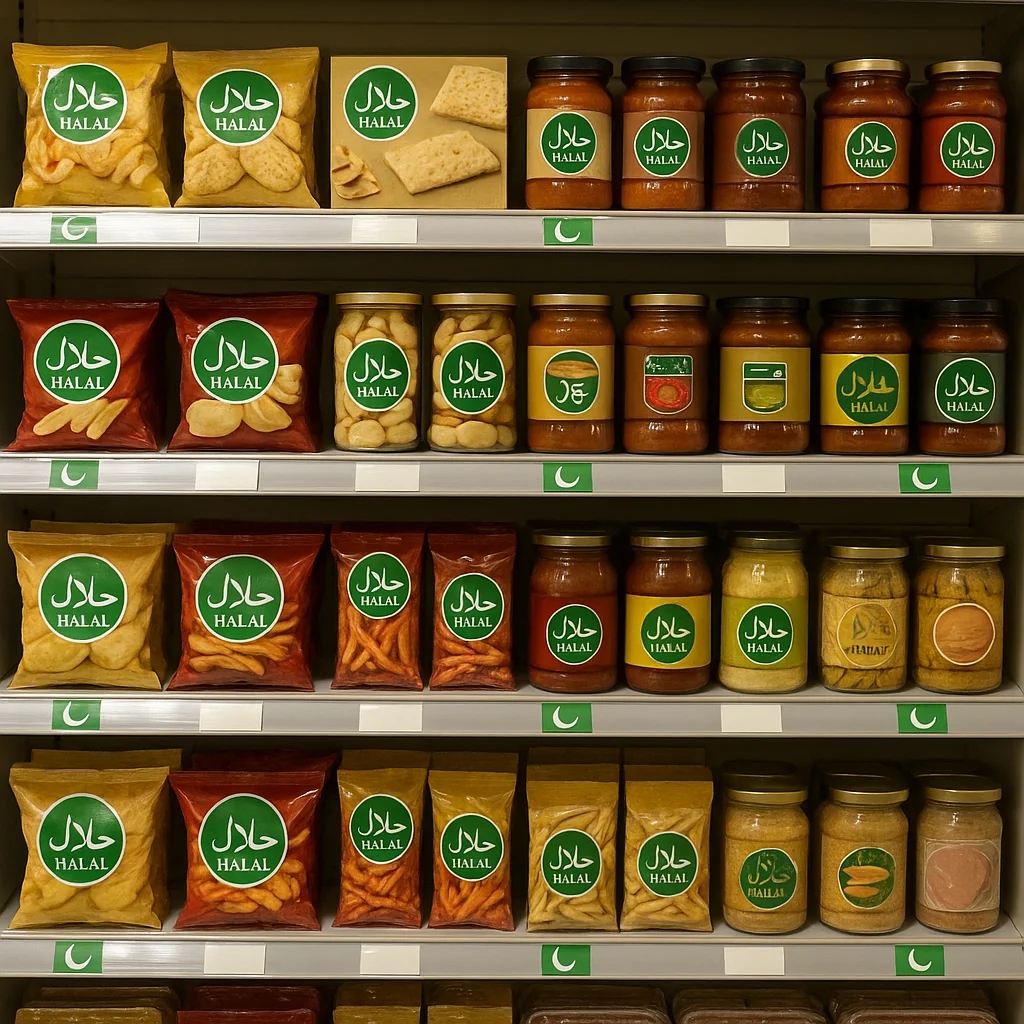
Halal Cosmetics and Products
The concept of halal products extends significantly beyond foods. Cosmetics, personal care, and hygiene products can and should also be halal, something that more and more Muslims are taking seriously. The reasons are multiple: many products are applied directly on the skin that must be clean for wudu (ritual ablution), some may be ingested accidentally like lipsticks, and there’s the Islamic principle of seeking purity (tayyib) in all aspects of life, not just in what we eat.
Makeup presents particular challenges because it uses pigments and substances that may come from problematic sources. Lipsticks almost always contain carmine (E120), an intense red colorant derived from cochineal insects, especially common in red and pink products. They may also contain beeswax (generally accepted by most), lanolin from sheep wool (may be problematic if not from halal source), and some contain alcohol. Skin care products like facial creams may contain collagen from pork or non-halal sources, elastin of doubtful animal origin, glycerin that may be animal or vegetable, and hyaluronic acid that may be of animal origin although increasingly it’s synthetic.
Personal hygiene products also require attention. Soaps and shower gels may contain tallow (animal fat that may come from pork), stearin of animal origin, or animal glycerin. Deodorants frequently contain alcohol as an active ingredient. Toothpastes may have animal glycerin or flavorings with alcohol. Perfumes present a special challenge because the base of almost all is ethyl alcohol in very high concentrations. On alcohol in perfumes there’s difference of opinion among scholars: some maintain that all alcohol is haram even in external use, while others argue that alcohol in external cosmetics that aren’t ingested is permitted, especially considering it’s denatured non-potable alcohol.
Halal certification for cosmetics follows processes similar to food but with specific considerations. There’s a growing number of recognized brands like Wardah (Indonesia), SimplySiti (Malaysia), and Ivy Beauty (USA) that offer certified halal products. To identify genuine halal cosmetics, look for official certification with visible halal logo, read the INCI ingredient list looking for components of animal origin, research the brand by visiting its website, and consult specialized databases. The TagHalal application can also help you verify many personal care products. Many Muslims opt for natural alternatives using ingredients like coconut oil, argan oil, shea butter, aloe vera, and honey, which are naturally halal and give them total control over what they use.
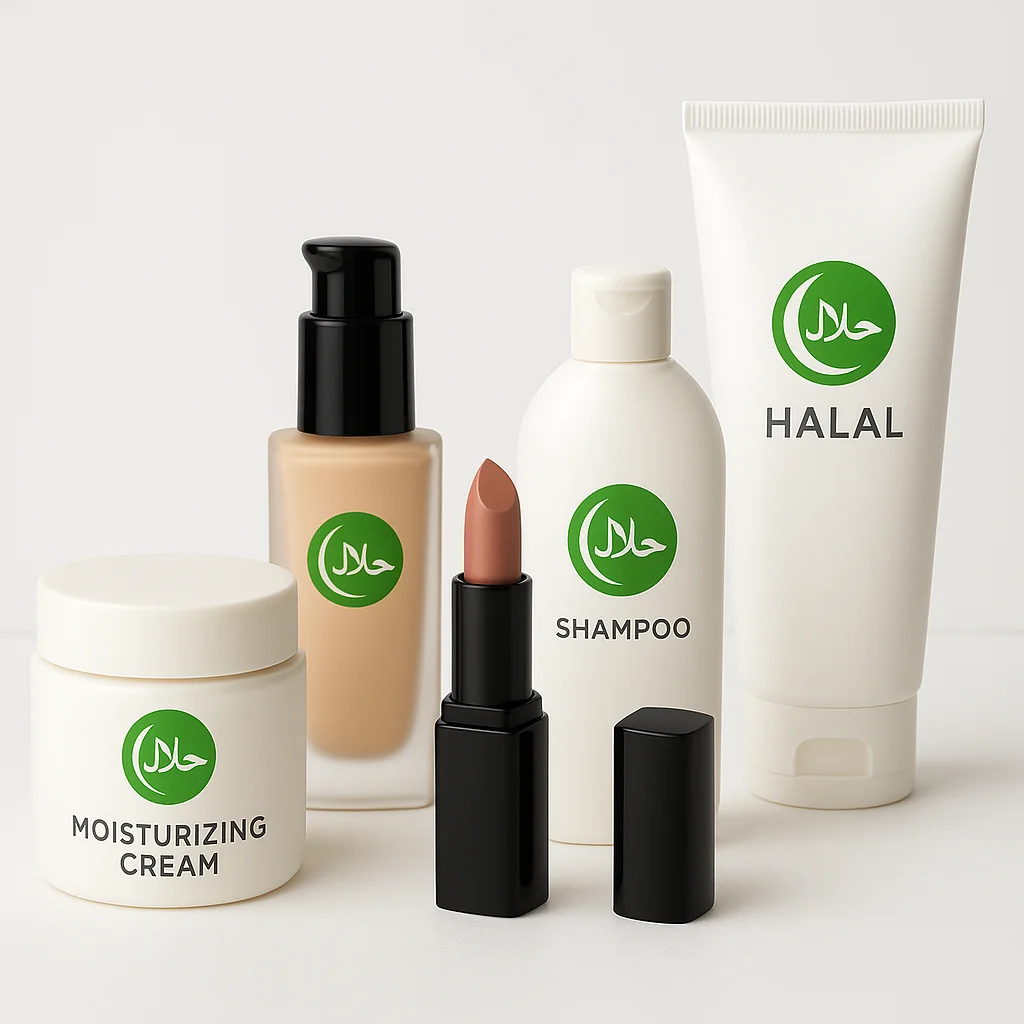
Ingredients and Additives to Avoid
In both foods and cosmetics, there are ingredients and additives that are clearly haram or doubtful (mashbooh). In the modern world of highly processed foods with very long ingredient lists, this knowledge is absolutely essential to maintain a truly halal diet and lifestyle.
Problematic food additives are frequently identified with E-codes. Among the most important are E120 (carmine or cochineal, from insects), E441 (gelatin, almost always from pork), E471 and E472 (mono and diglycerides of fatty acids, may be from animal or vegetable fats), E422 (glycerin, may be animal or vegetable), and E627, E631, E635 (flavor enhancers that may contain pork derivatives). Animal ingredients to avoid include gelatin (unless it specifies fish or has halal certification), rennet (enzyme from calves’ stomach), pepsin (from pig stomach), lipase (may be from pork), lard or shortening (may be pork lard), tallow (animal fat), collagen (from bones and skin), elastin, keratin (from hair or hooves), and various types of vitamins that may have problematic origins.
Alcohol and its derivatives deserve special attention. Ethyl alcohol or ethanol in beverages is always haram without exception. In processed foods, most scholars consider it haram even in small amounts. In cosmetics and external products there’s difference of opinion, with some scholars prohibiting it completely and others permitting it for external use. In medicines it’s permitted in cases of medical necessity when there are no alternatives. It’s important to distinguish that sugar alcohols (sorbitol, mannitol, xylitol, erythritol) are generally halal because they’re not real ethyl alcohol, don’t intoxicate, and are chemically different. Fatty alcohols (cetyl alcohol, stearyl alcohol, cetearyl alcohol) are also halal because they’re solid waxes used in cosmetics, not intoxicating liquids.
To handle doubtful ingredients, follow these principles: when you’re certain something is haram, avoid it completely; when something is doubtful (mashbooh), if it’s easy to avoid it’s better to do so; in case of real doubt, consult with an imam or trusted scholar. The principle of necessity (darurah) permits that in cases of genuine necessity, especially medical, some normally prohibited things may be temporarily permitted, like medicines with pork gelatin when there’s no available halal alternative. To effectively verify ingredients, use the TagHalal application that has extensive information about ingredients and E-codes, consult specialized websites, participate in Islamic forums, and always consult with scholars for complex cases. The most practical advice is: inform yourself about common problematic ingredients, always verify looking for halal certification when possible, ask manufacturers directly when you have doubts, prioritize certified products, and simplify by opting for natural and unprocessed foods when possible.
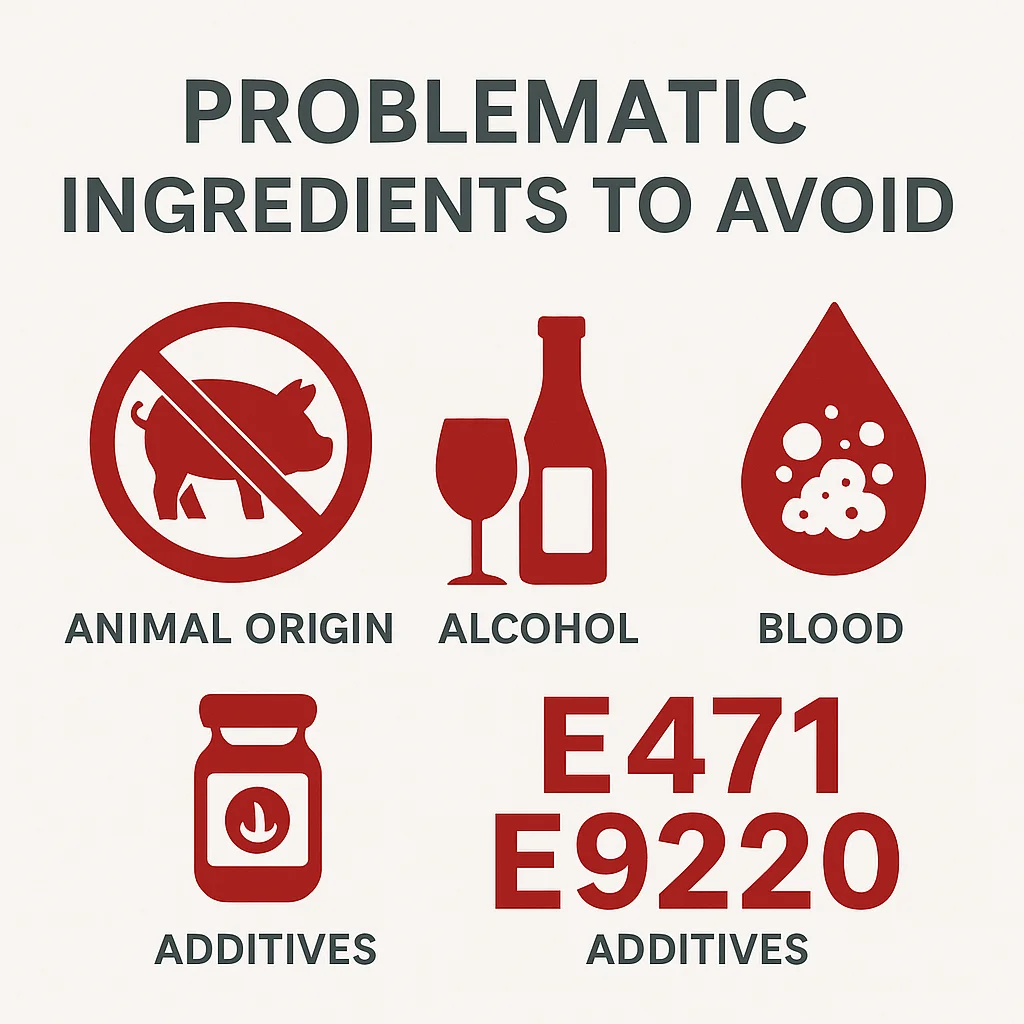
Benefits of Halal Food
Halal food is not only a religious obligation for Muslims; it also offers numerous practical, tangible, and verifiable benefits that explain why more and more non-Muslims are also consciously choosing halal products. These benefits span aspects of hygiene, quality, ethics, health, and well-being that go far beyond simple compliance with religious precepts.
Hygiene and Quality Aspects
One of the most tangible benefits of halal food is the extraordinary emphasis on hygiene and quality at every stage of production. Islamic law (Sharia) establishes cleanliness requirements that go beyond basic sanitary regulations. Halal processing plants must be maintained impeccably at all times, with regular and rigorous equipment cleaning, strict disinfection protocols, and complete separation of areas to prevent cross-contamination. Personnel working in halal facilities must maintain high standards of personal hygiene, wear clean and protective clothing, wash their hands frequently, and undergo regular health examinations. Pest control systems are effective and preventive, with constant monitoring.
The quality of halal meat is directly related to the slaughter process. Complete blood drainage significantly reduces microbial risk because blood is an ideal medium for bacteria. The meat preserves better and longer with less probability of rapid decomposition. Only completely healthy animals can be slaughtered as halal, since there must be veterinary inspection before slaughter and sick animals are rejected, guaranteeing that the meat comes from genuinely healthy animals. Traceability in halal products is extraordinary: certification requires complete traceability from origin to final consumer, with detailed record of each stage that can be audited at any time.
Halal products are free of many harmful substances. Many halal producers avoid artificial growth hormones, allowing animals to grow naturally. Antibiotic use is limited and controlled, used only when medically necessary with waiting periods before slaughter. Animals are not fed with animal meals but receive natural diets appropriate for their species. In processed products there’s strict control of preservatives, avoidance of problematic additives, and preference for natural ingredients. Certification processes involve frequent audits with regular inspections and unannounced surprises, product sampling and analysis, and continuous verification of facilities and processes.
Although it’s not the main objective of halal food but to comply with Allah’s commandments, it can offer health advantages. Lower residual blood content means fewer toxins and lower bacterial load. The complete absence of alcohol eliminates harmful effects on liver, brain, and other organs. Avoidance of pork eliminates associated risks like parasites and certain saturated fats. Emphasis on pure foods (tayyib) promotes consumption of natural foods, less processed, with simpler and more recognizable ingredients. Food safety benefits from strict hygiene protocols that reduce contamination risk, lower incidence of food poisoning, more rigorous controls, and greater accountability and traceability. Finally, the transparency that comes with halal certification is invaluable: consumers know exactly what they’re eating because ingredients have been verified, labeling is clear, and information is accessible.
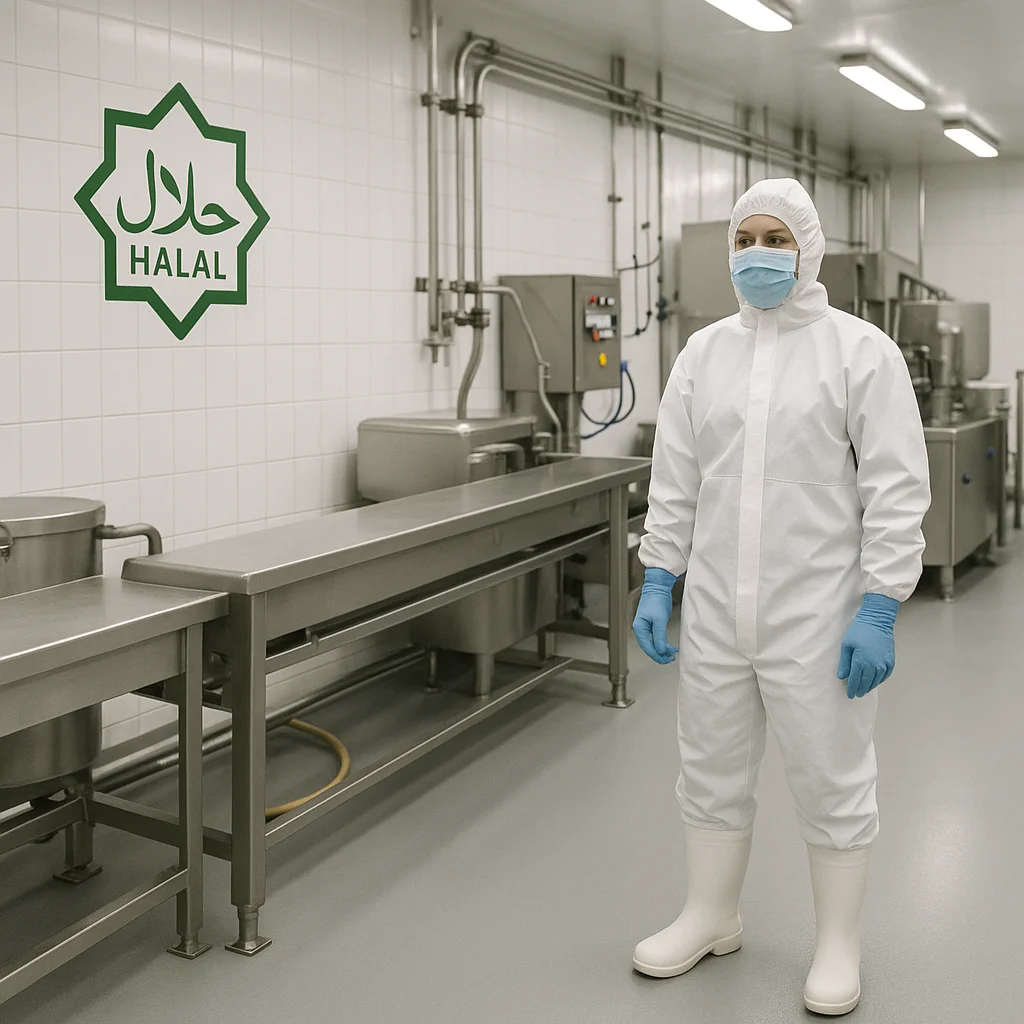
Animal Welfare
Islam places extraordinary emphasis on ethical and compassionate treatment of animals. This emphasis is not peripheral but central to Islamic teachings. The halal concept includes not only how the animal dies but how it lives throughout its entire existence. Prophet Muhammad (peace be upon him) established very clear principles: “Verily, Allah has prescribed excellence in all things. Thus, when you kill, kill well, and when you slaughter, slaughter well. Let each one sharpen his blade and let the animal rest.” This hadith establishes that we must treat all things with excellence, that even when it’s necessary to kill an animal for food it must be done in the best possible way, and that we must minimize suffering as much as humanly possible.
Animal welfare requirements in halal production are detailed and go beyond what’s typically required in conventional agriculture. Throughout the animal’s life, it must have adequate living conditions with sufficient space to move, access to appropriate shelter, protection against extreme weather, and clean and ventilated environment. Feeding must be appropriate with natural feeding according to its species, constant access to clean water, balanced nutrition, and complete prohibition of feeding herbivores with animal meals. There must be appropriate veterinary care when necessary, active disease prevention, appropriate vaccination, and immediate treatment of injuries. Daily treatment must be respectful with absolute prohibition of physical mistreatment, no hitting animals allowed, avoiding unnecessary stress, and handling must be gentle and careful.
During transport, vehicles must be appropriate with adequate ventilation, sufficient space, and protection against extreme temperatures. Journey duration should be minimized, there must be access to water, and loading and unloading must be done with appropriate ramps. At the time of slaughter, stress minimization is priority: the animal must never see others being slaughtered, the environment must be calm, handling must be gentle, and the animal must not be frightened in any way. The dhabiha method is specifically designed to minimize pain: the quick and precise cut with extremely sharp knife ensures speed, cutting carotid arteries causes loss of consciousness in only two to five seconds, and subsequent convulsions are automatic nerve reflexes without conscious pain.
When we compare the halal method with conventional methods, we find significant advantages. Many halal certifiers reject extreme confinement systems common in industrial agriculture. The prohibition of slaughtering sick animals incentivizes better care throughout life. There’s greater personal responsibility because the slaughterer is personally responsible before Allah. There’s greater connection and consciousness of the act of taking a life, it’s not just an automated industrial process. The invocation of Allah’s name reminds us that taking a life, even when permissible, is something serious that must be done with respect and gratitude. The impact on the industry is positive: there’s greater awareness among producers about animal welfare, improvement of general standards, and halal products positioning themselves as a premium ethical option for conscious consumers both Muslim and non-Muslim.
Why Non-Muslims Consume Halal
An interesting and growing phenomenon is the increasing number of non-Muslim consumers who consciously choose halal products. This phenomenon says a lot about the universal benefits of halal standards that go beyond purely religious considerations.
The most common reason is the well-founded perception of higher quality and hygiene. Many non-Muslim consumers associate “halal” with superior production standards, and this association is based on observable realities: stricter hygiene standards, greater quality control with more frequent audits, more exhaustive certification processes, and complete traceability. Common testimonials include: “I know halal meat has passed through very strict controls,” “I trust halal certified products more,” “Halal meat seems cleaner and fresher to me.” Growing concern for animal welfare is another main reason. Ethical consumers care about how animals lived throughout their entire existence, seek more humane slaughter methods, want to avoid cruel industrial farms, and value respectful treatment of animals as sentient beings. For many, Islamic ethical principles about animal treatment align well with their own personal values.
Perceived health benefits motivate many non-Muslim consumers. Although more rigorous scientific research is needed, many believe halal food is healthier due to complete blood drainage, cleaner with fewer bacteria from more hygienic processes, free of certain problematic additives, and more natural with less processing. Some people have specific dietary preferences: they don’t eat pork for health or personal preference, have allergies to certain ingredients and appreciate transparency, avoid alcohol for health or recovery, or simply prefer to avoid certain ingredients and find that halal certification facilitates identifying appropriate products.
In multicultural societies, mixed communities and relationships naturally lead to choosing halal. In mixed families where one spouse is Muslim, choosing halal foods allows everyone to eat the same without conflicts. In diverse friend groups, choosing halal restaurants ensures everyone can eat. At social gatherings, serving halal food is inclusive. In workplaces, offering halal options shows respect. The desire to share meals without excluding anyone naturally leads to halal options that are acceptable for Muslims and perfectly edible for everyone else. Finally, modern consumers value transparency and clear labeling. Certified halal products offer exactly that: knowing what their food contains without surprises, clear and honest labeling, complete transparency in ingredients, and verifiable certification.
The statistics are notable: it’s estimated that between fifteen and twenty percent of halal product consumers are not Muslim. In some multicultural urban areas, this percentage may be even higher. Significantly, the halal market is growing faster than Muslim population growth, clearly indicating that the additional growth comes from non-Muslim consumers who choose halal for its universal benefits of quality, ethics, and transparency.

Halal Food: The Global Market
The global halal food market is one of the fastest-growing sectors in the entire global food industry. Understanding its magnitude, trends, and projections is important both for Muslim consumers who want to see how the halal world evolves, and for entrepreneurs who see the enormous opportunities this market represents.
Growth of the Halal Market
The global halal products market has experienced remarkable exponential growth and all projections indicate this growth will continue accelerating. The global halal food market is currently estimated at more than two trillion US dollars annually, and is projected to reach between three point five and four trillion dollars by the year two thousand thirty. This represents an annual growth rate of approximately eight to ten percent. To put these numbers in perspective, the halal market represents approximately eighteen to twenty percent of the total global food market, which is extraordinary.
The global Muslim population, which is the base of the halal market, is enormous and growing. Currently there are more than one billion eight hundred million to two billion Muslims in the world, approximately twenty-four percent of the global population. By the year two thousand thirty, it’s projected to reach approximately two billion two hundred million. Europe has approximately forty-four million Muslims, and Spain alone has more than two million, creating a substantial market. The factors driving this growth are multiple: demographic growth of the Muslim population growing faster than the global average, greater purchasing power with the expanding Muslim middle class especially in countries like Indonesia, Malaysia, Turkey, and Gulf countries, increasing urbanization with Muslims moving to cities with greater access to certified products, and growing religious consciousness with greater knowledge about halal requirements thanks to access to information.
Globalization has created demand for halal products in new markets. Muslim migration to Western countries has stimulated an entire infrastructure of production, certification, and sales. Halal tourism is growing explosively with Muslims traveling more and demanding halal options in destinations that historically didn’t have them. E-commerce has revolutionized access with online sales growing exponentially, allowing Muslims in rural areas to order certified products. Different regions present different characteristics: Asia-Pacific is the largest market with Indonesia (more than two hundred thirty million Muslims) and Malaysia leading in standards; Middle East and North Africa with Saudi Arabia, Emirates, Egypt, and Turkey representing premium and enormous markets; Europe with France, Germany, United Kingdom, and Spain having rapidly growing markets; and America with United States, Canada, and communities in Latin America expanding.
Availability of Halal Products
The availability of halal products varies significantly depending on geographical region, size of local Muslim population, and type of product being sought. In Muslim-majority countries like Indonesia, Malaysia, Saudi Arabia, Turkey, Egypt, and Pakistan, availability is high and ubiquitous. Practically all foods are halal by default, conventional supermarkets automatically offer halal products, butcher shops in each neighborhood sell halal meat, and restaurants are mostly halal. The advantages are tremendous ease in finding products everywhere, wide variety, and competitive prices. The considerations are that imported Western products may not be halal and require verification, and tourist areas may have non-halal options for foreign visitors.
In Western countries with significant Muslim populations, the situation varies dramatically between large cities and rural areas. In large cities like London, Paris, New York, Toronto, Berlin, Madrid, and Barcelona there’s good to excellent availability. There are completely halal specialized supermarkets, many large conventional supermarket chains include dedicated halal sections, there are numerous halal butcher shops especially in Muslim neighborhoods, and halal restaurants offer great variety from fast food to haute cuisine. Where to find them: neighborhoods with concentrated Muslim population have the greatest concentration of stores, areas near mosques usually have good availability, ethnic markets are excellent sources, supermarkets like Carrefour, Tesco, or Walmart have halal sections in some branches, and specialized online stores offer delivery with greater variety.
In rural areas or small towns, availability may be limited or non-existent. There are fewer physical options, may require traveling to nearby cities, and greater dependence on online shopping. Solutions include using online shopping extensively with specialized sites, making periodic visits to cities for bulk purchases, contacting local butchers for halal slaughter if requested (verifying certification), and organizing community networks where groups of Muslims organize joint purchases. The easiest products to find anywhere are those naturally halal: fresh fruits and vegetables, fresh fish, eggs, milk, basic grains, legumes, and vegetable oils are available everywhere. The most difficult products to find are specialized products, certain less common meat cuts, halal organs, lamb or goat products, and certified halal cosmetics.
Positive trends show continuous improvements: more conventional supermarkets are including halal options, there’s growth in specialized stores, greater presence in conventional retail, e-commerce explosion with faster deliveries, and mobile applications like Tag Halal making it easier to find and verify halal products by scanning barcodes and locating nearby stores. Specialized halal chains are expanding with franchises growing and standardization of offerings making it easier for consumers to know what to expect.
Halal Restaurants and Establishments
Halal restaurants are a fundamental part of the halal experience and lifestyle, offering everything from fast food to haute cuisine and covering practically all the world’s cuisines. Different types cater to different needs: halal fast food restaurants include burgers, fried chicken, pizza, shawarma and döner, and falafel, with accessible prices and fast service; halal ethnic restaurants offer authentic Turkish (kebabs, köfte), Arab (mezze, grills), Pakistani and Indian (curry, biryani), Moroccan (tagines, couscous), Persian, Malay and Indonesian, and Bengali cuisine; halal fine dining restaurants emerging in major cities with sophisticated gastronomy and innovative fusion cuisine; halal buffets with extensive variety ideal for groups; and halal cafés and pastry shops serving traditional sweets, coffee and tea, and elaborate desserts.
How to identify truly halal restaurants is crucial. Physical signs include a current visible halal certificate typically at the entrance or window, which should be current, legible, and issued by a recognized organization. Signage frequently includes “Halal” signs sometimes in Arabic (حلال) and the certifier’s logo. The restaurant’s location in areas with Muslim population or near mosques often indicates halal availability. Modern resources for finding restaurants include mobile applications like Zabihah (global database with reviews), HalalTrip (directory with photos), Muslim Pro (with locator), and Yelp or Google Maps with halal filter; websites with local directories and halal food blogs; social media with Facebook groups, restaurant Instagram, and TikTok with reviews; and traditional word of mouth with community recommendations and questions at mosques.
Important questions when certification isn’t visible include: Do you have current official halal certification? From which specific organization? Is all your meat halal or only some dishes? Do you use alcohol in cooking? Do you have pork products? Do you share equipment with non-halal food? Types of certification vary in rigor. A one hundred percent halal restaurant means everything on the menu is halal, no alcohol is served, there’s no pork, equipment dedicated exclusively to halal, and it’s the best option. A restaurant with halal options means only part of the menu is halal, they may serve alcohol, there’s risk of cross-contamination, and requires extreme caution. Many scholars prefer one hundred percent halal restaurants to avoid doubts.
International chains have some halal branches in certain locations: KFC, McDonald’s, Subway, Nando’s, Pizza Hut, and Domino’s have halal branches but it’s crucial to always verify because not all branches of a chain are halal. Specialized halal franchises are growing with brands like German Doner Kebab, Halal Guys expanding internationally, and local chains that vary by region but are rapidly growing. The halal culinary experience is evolving with halal fine dining emerging in major cities, halal food trucks offering authentic street food, and halal events and fairs with festivals and temporary markets celebrating halal gastronomy.
[[ INCLUIR IMAGEN – A14 – ]]
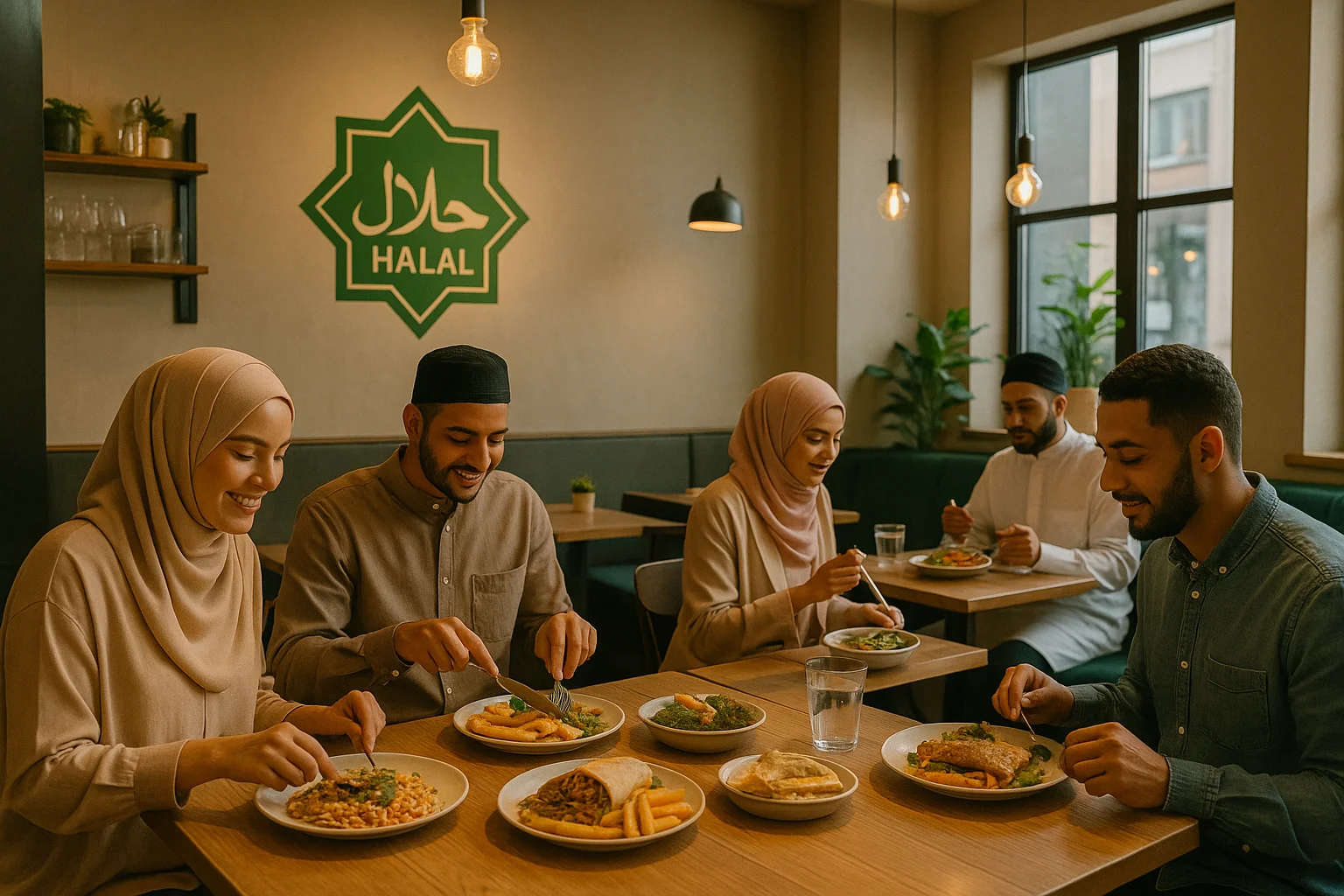
Frequently Asked Questions About What is Halal
Is all Muslim food halal?
Not necessarily. Being Muslim doesn’t automatically guarantee that food is halal. A Muslim may have good intentions but if they don’t know all the detailed requirements they may serve non-halal food without realizing it, using ingredients with hidden haram additives or meat without appropriate certification. Knowledge about halal requirements varies among Muslims, and the level of religious practice also varies. A restaurant owned by Muslims doesn’t automatically guarantee it’s halal: they may use suppliers without certification or serve only partially halal. The recommendation is to always look for visible official certification even in Muslim establishments, don’t assume based on the owner’s origin. Distinguish between “Muslim food” (traditional food from Muslim cultures like Turkish, Arab, Pakistani) and “certified halal food” (which has passed through formal certification). A Turkish restaurant in Spain may or may not be halal, always verify by asking and looking for certification.
Is fish halal?
Yes, fish is generally halal according to the vast majority of scholars. All types of fish with scales are completely halal without need for ritual slaughter: salmon, tuna, hake, cod, sardines, and hundreds of other species. Fish doesn’t require a Muslim to catch it, doesn’t need invocation of Allah’s name, and it’s permissible to eat fish caught by non-Muslims. You can buy it at any regular fish market without need for specific halal certification, as long as it’s fresh and fit for consumption. The Quran says clearly: “Lawful to you is game from the sea and its food” (Quran 5:96). Shellfish (shrimp, lobsters, octopus, squid) have divided opinions: the Shafi’i, Maliki, and Hanbali schools permit them all, while the Hanafi school is more restrictive generally permitting only fish with scales, although many Hanafis also permit shrimp. If you have doubts, fish with scales is always safe and universally accepted. Aquatic animals like crocodiles, turtles, frogs, water snakes, and marine mammals have very divided opinions or are forbidden, better to avoid them.
What happens if a Muslim eats something not halal?
It depends on the circumstances. If it was intentional without necessity, it’s considered a sin and requires sincere repentance (tawbah), asking Allah for forgiveness and committing not to repeat it. If it was accidental or unknowingly, there’s no sin because Allah doesn’t punish for honest mistakes. The Quran says there’s no fault in what is eaten by mistake, only in what’s intentional. If it was due to extreme necessity (darurah) like a life-or-death situation without halal alternative, it’s temporarily permitted, limiting oneself to the minimum necessary. What to do if you discover you ate something haram: stay calm, verify if you’re sure it was haram and if it was intentional, repent sincerely if it was intentional, you don’t need to vomit (what was already digested has passed), and continue with your life without obsessing. Allah forgives when repentance is sincere. To avoid in the future: always verify certifications, read labels, ask at restaurants, use the Tag Halal application to scan products, and when you have serious doubt it’s better to avoid it. Don’t be too hard on yourself; Allah is Merciful and values sincere effort.
Where to buy certified halal products?
Main options include specialized halal stores that are establishments dedicated exclusively to halal products with knowledgeable staff and wide variety, findable using Google Maps searching “halal store” or asking at your local mosque. Halal butcher shops specialized in fresh meat with slaughter according to Islamic norms, where you should verify visible certificate and recognized organization. Conventional supermarkets with halal section like Carrefour, Tesco, or Walmart in some branches, although availability varies by specific location. Online shopping with sites specialized in halal products that deliver to home, Amazon with halal section (always verifying certifications in descriptions), and marketplaces in your country searching “halal.” Ethnic markets Arab, Turkish, Pakistani with authentic atmosphere and hard-to-find products. Cooperatives and group purchases where groups of Muslims organize joint purchases directly from wholesalers with significant savings. And direct farms where some farmers offer halal slaughter. To verify products use the Tag Halal application scanning barcodes to instantly verify if products are halal. Always look for the visible halal certification seal, read ingredient lists, and ask staff when you have doubts. Never assume something is halal without verifying.
Conclusion
We’ve explored in depth what is halal, from its fundamental halal meaning to the most complex aspects of halal certification and the global halal products market. Halal means “permitted” in Arabic and represents a complete system of life that encompasses not only food but all aspects of Muslim existence. Halal food includes most natural foods with only a few specific exceptions, with halal meat being one of the most regulated aspects requiring slaughter according to the dhabiha method.
Halal certification is essential in the modern world to navigate complex supply chains and processed products with multiple ingredients. Certifying organizations exhaustively verify that products meet all Islamic requirements from origin to final consumer. To verify products, always look for the certification seal from recognized organizations and use modern tools like the Tag Halal application that allows you to instantly scan products and reliably verify their halal status. Halal foods go beyond meat and include processed products, cosmetics, and personal care products, all requiring attention to potentially haram ingredients and additives.
The benefits of halal food are multiple: superior hygiene and quality standards with rigorous audits and complete traceability, emphasis on animal welfare throughout its life with ethical and respectful treatment, and ingredient transparency that more and more non-Muslim consumers also value. The global halal food market is growing exponentially reaching trillions of dollars, with increasing availability in both Muslim and Western countries, and halal restaurants offering everything from fast food to haute cuisine in practically all world cuisines.
Beyond rules and regulations, understanding what is halal connects us with obedience to Allah in our daily life, respect for God’s creation, consciousness about what we consume, and physical and spiritual purity. Maintaining halal food is not just a religious commandment but a way of life that promotes health, ethics, consciousness, and spirituality. In a world where foods travel thousands of miles and pass through complex processes, the halal concept reminds us of the importance of knowing what enters our bodies and how it was produced. Whether you’re beginning your learning about what is halal or seeking to deepen your knowledge, remember that every effort to follow Islamic teachings in your diet is valued by Allah. May Allah facilitate your path toward a completely halal life, accept your efforts and always guide you toward what is permitted and beneficial.

